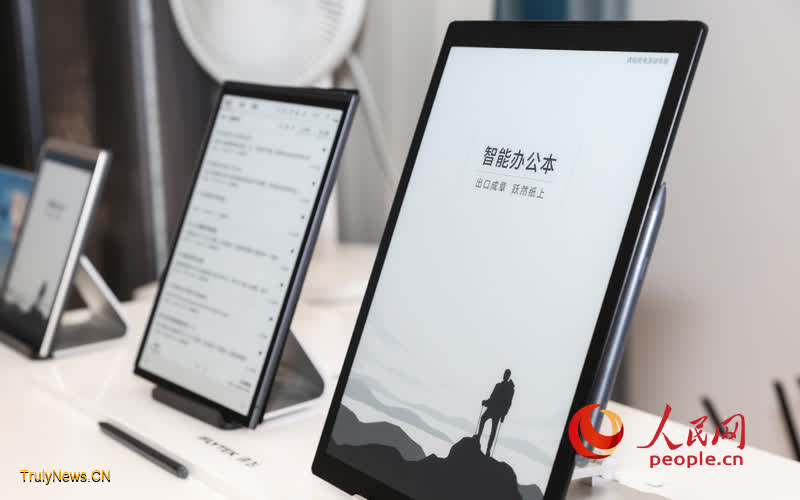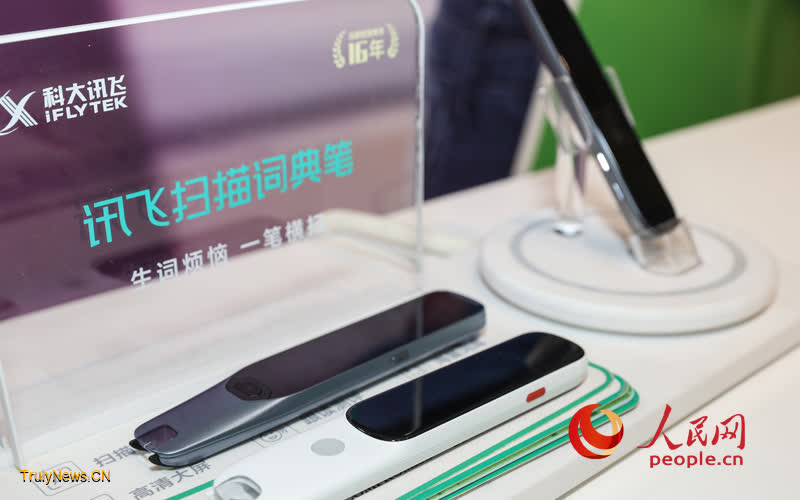On the morning of July 11, at iFLYTEK Co., Ltd. in Hefei, a People’s Daily Online reporter engaged in a human-machine dialogue with the iFLYTEK’s large language model SparkDesk.
Not long ago, the project “Key Technologies and Industrialization of Multilingual Intelligent Speech”, led by iFLYTEK, won the first prize of the State Science and Technology Advancement Award. This marks the first time in a decade that a project in the field of artificial intelligence (AI) has won the first prize and it is also the third time that iFLYTEK has received the State Science and Technology Advancement Award.
How has iFLYTEK managed to achieve this distinction three times?

iFLYTEK’s Smart Office Notebook. (People’s Daily Online/Zhang Jun)
“This is closely related to our persistent strategy of ‘pushing the limits of technology while grounding applications firmly in reality,” said Wu Junhua, vice president of iFLYTEK. He explained that the award-winning project encompasses both innovative technology and practical applications.
Technologically, the project has achieved numerous breakthroughs.
“For example, in intelligent speech technology, speech recognition in complex environments is the most challenging,” said Gao Jianqing, executive vice president of the iFLYTEK Research Institute. Through innovative methods, the company has tackled difficulties related to distant sound pickup, noise interference, and multi-speaker scenarios, significantly improving the accuracy of speech recognition in complex environments. “We have also overcome challenges related to the lack of linguistic data and experts, extending the technology to 69 lesser-used languages,” he revealed.
On the application front, as a leading publicly listed company in the Asia-Pacific region for intelligent speech and AI, iFLYTEK has put considerable effort into supporting practical applications for their technology over its 25 years of history.
Leveraging AI technology, iFLYTEK has supported sectors such as education, healthcare, finance, automotive, urban management, telecommunications, and manufacturing, achieving significant results. “Especially in the fields of education and healthcare, our technology and products have been able, to a certain extent, to alleviate issues related to resource shortages in some regions,” said Wu.
iFLYTEK’s presence isn’t limited to only its own products, as the company also hosts a platform to foster the development of an AI product ecosystem. As of the end of May this year, the iFLYTEK Open Platform has offered 707 AI products and capabilities, attracting around 7 million developer teams, with a total of more than 2.4 million applications covering over 4 billion terminal devices.

iFLYTEK’s Smart Dictionary Pen. (People’s Daily Online/Zhang Jun)
“In the era of general artificial intelligence, we must achieve higher levels of self-reliance and independence in the global technology competition,” said Liu Qingfeng, chairman of iFLYTEK.
The company has also donated iFLYTEK Smart Dictionary Pens to the Hungarian-Chinese Bilingual School in Budapest to help the students learn Chinese and is also providing full scholarships for students to pursue AI studies at universities in Anhui Province. Ferenczi Samuel, a 12th grader who has been granted iFLYTEK’s full scholarship, said he was excited to study in China, calling it “a great opportunity”.
Looking ahead, iFLYTEK plans to step up its efforts in the innovation of large models, focusing on speech, general cognition, and multimodal technology. In terms of practical applications, the company aims to deepen the integration of large models with sectors like education, healthcare, automotive, and office automation.
Recently, the iFLYTEK’s SparkDesk 4.0, a large model product, was officially released. This is another solid step forward for iFLYTEK in its future journey.
(Tuo Zhouyu, as an intern, also contributed to this article.)